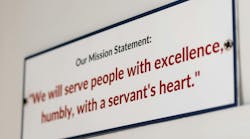If you’re familiar with the stock market, you know what a stop-loss is. You may even have a plan in place with your broker. Stop-loss is a market order put into place to protect investors. It is a predetermined plan set up with a broker instructing them to sell a security once it reaches a certain price — a contingency plan. But your shares in the stock market aren’t the only things you need a stop-loss plan for.
If something goes awry, it’s important to have a strategy in place for the technology in your business. Chances are you rely on computers daily to keep things running smoothly. Between your point-of-sale (POS) system, security cameras and administrative paperwork alone there is a lot of valuable and sensitive information that should be stored correctly. What would happen if your POS system decided to crash? Would you have a way to retrieve your data? What if you noticed some equipment missing and needed to reference your security camera, would the footage be there?
Ironically, when I called to interview the newly-elected president of AOCA and owner of Texas-based business, Kwik Kar Lube and Auto Care of Hudson Oaks and Aledo, Len Minco, he was restoring one of his own computers that had recently crashed.
“The hard part isn’t getting the computer backed up, it’s getting your programs and data back on it,” Minco said. “Luckily, I back everything up.”
Hardware failures, computer viruses, hackers, disgruntled employees and even disastrous situations such as fires, floods or tornados are all reasons you should secure your network and backup important information regularly.
“From a data loss perspective, the lack of financial records can hinder a business greatly if they are unable to collect receivables, pay bills and verify information. From an auditing perspective, business owners need their financial reports to verify important documents, like tax returns and income statements,” said Mark Dryer president of MDL Technology, an IT outsourcing company. “Having a reliable backup system can minimize downtime and data loss while maximizing business continuity and security.”
There are two main storage solutions for business owners — cloud and hardware. But before deciding which one to use, ask yourself these questions:
1. Do you have a contingency or disaster recovery plan in place?
2. What data do you need to backup?
3. How often do you need to backup information?
4. What is your level of technical knowledge?
5. How much can you afford to spend?
Answering the above questions will help you determine a framework for what your backup solution needs to look like. From there, you can go about putting a strategy into place.
“It’s good business practices to backup all financials, your store operational systems and video cameras. I also back up my personal laptop because it has pertinent business information on it, too,” Minco said.
If you want to be able to access your data from anywhere at any time and you don’t want to spend a lot of money, then cloud storage is probably may be the best option for you.
“The cloud is the best option for most businesses because it’s financially feasible and easy to set up. You don’t have to make any large investments in hardware, and the cloud provider should give you easy-to-follow instructions. So have no fear, even if you’re not a qualified IT professional,” Dryer said. “The cloud is secure, and you can retrieve your files from anywhere. This makes it a good solution in case you have hardware that’s stolen or — heaven forbid — a disaster occurs. You can also set it up to automatically backup at a certain time. I backup my information every time I make changes to a file.”
If using the cloud makes you uneasy or you don’t like the idea of other people having your files you can consider a My Cloud which is essentially your own wireless hard drive you can keep offsite. For example, back up your information at work and store your hard drive in your home office.
“My Clouds are basically just getting back to where we started with hard drive backups, except now they can be hooked up to the internet instead of your machine directly,” Minco said. “The My Cloud concept has been around for years but has only recently taken off.”
If you’d rather have traditional onsite backups, you can use network-attached storage. These are things like thumb drives, external hard drives or another computer. You can leave these onsite for a quick recovery solution. If you prefer to remove them daily for security, that’s also a possibility.
“I use jump drives for some of my data. For some of my other data I use external drives,” Minco said.
The good news is backing up your information doesn’t take a whole lot of technical knowledge, so don’t be intimidated by the idea. You will need to make sure you have a process in place to ensure your technology is consistently backed up.
“If you go with a traditional backup method, there’s always a software component you’ll need to configure. You’ll need to check it manually, once a day or have a report emailed to you so you know whether the backup was successful or not,” Dryer said. “If you’re planning on backing up something like security camera footage, consider how much storage you have and what your retention policy is. The quality of the video can affect how much storage it takes up. A lower quality video may not require as many gigabytes of space as one with higher quality. Since offsite backups are usually less expensive — 30 to 50 cents per gigabyte — than onsite backups, if you’re planning on needing a lot of space, hardware may not be the way to go.”
Minco suggests backing up your information every night — that’s what his stores do.
“I back up my operational systems nightly. They stay at the stores, but it’s also a good idea to keep a copy offsite in case something happens,” Minco said. “My personal laptop is backed up offsite weekly, and my POS systems use the backup that ISI recommends. If you can’t retrieve your information on a hard drive, you’re kind of done, unless you want to send it to a retrieval company, and even then, it’s not a guarantee.”
You may want to communicate with a local IT consultant who can help evaluate your needs. Don’t find yourself in a situation where you wished you had a stop-loss plan in place before the market — or your computer — crashed.





